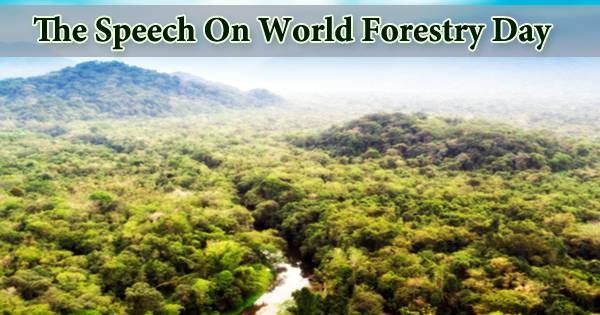A very Good Morning/Afternoon/Evening (Ladies and Gentlemen) to the Honorable Principal Sir/Madam, respected teachers, parents, seniors, and my dear friends/students, Warm Greetings to Everyone! Thank you all for taking out time and being present at this seminar session. Today, we are here to discuss/celebrate a most important day, ‘World Forestry Day’.
Every year on March 21st, World Forestry Day, also known as the “International Day of Forests,” is celebrated at the international level to raise public awareness about the importance, significance, and contributions of forests to the earth’s life cycle. Deforestation is one of the issues discussed on the day. We don’t often equate drinking a glass of water, writing in a diary, taking fever medication, or building a house with forests. Yet, in some way or another, these and many other facets of our lives are intertwined with forests.
Forests, their sustainable management and resource use, particularly in vulnerable habitats, are crucial to mitigating climate change and contributing to current and future generations’ stability and well-being. Forests are also essential for poverty alleviation and achieving the Sustainable Development Goals (SDGs). Throughout the year, a number of activities honor and raise awareness of the significance of all types of forests, as well as trees outside of forests, for the benefit of current and future generations. On International Day of Forests, countries are encouraged to coordinate local, national, and international events involving forests and trees, such as tree-planting campaigns.
Respectfully, ladies and gentlemen, The World Forestry Day was created in 1971 at the European Confederation of Agriculture’s 23rd General Assembly. The United Nations Food and Agriculture Organization decided that it would be commemorated as an annual occurrence on March 21st. The first commemoration of the day took place on March 21, 2013. For the International Day of Forests, the United Nations (UN) collaborates with states, environmental groups, and the general public to support both local and global activities. Activities include:
- Tree planting campaigns.
- Photo exhibits that portray the importance of forests and trees.
- Sharing infographics, videos, news, and messages via social and other media.
Forests occupy about one-third of the world’s land area, as we all know. Forests provide a living for about 1.6 billion people, including over 2000 indigenous cultures. Forests are vital to the planet for many reasons, including:
- Providing habitat for more than half of all terrestrial animal, plant, and insect species.
- Contributing to the balance of oxygen, carbon dioxide, and humidity in the air.
- Protecting watersheds, which supply fresh water to rivers.
Forests are the most biologically complex habitats on the planet, comprising more than 80% of all terrestrial animal, plant, and insect species. Forestry, like other branches of agriculture, is a significant field that needs public attention. It is important for the general public to comprehend the importance of forests in our everyday lives as a source of raw materials, local jobs, and national revenue. The World Forestry Day celebration offers a great opportunity for everyone to learn more about their role in preserving people’s well-being. People express their experiences and ideas by working together to integrate forests into future climate change plans during this event celebration.
Ladies and gentlemen, today’s forests occupy more than 30% of the world’s land and are home to over 60,000 tree species, many of which are still unknown. For approximately 1.6 billion of the world’s poorest people, including indigenous peoples with distinct cultures, forests provide food, fiber, water, and medicines. According to the resources, people are responsible for the loss of about 13 million hectares (32 million acres) of forest each year. The depletion of forests hastens the extinction of forest-dwelling animal species. Deforestation disrupts the natural climate equilibrium, triggering global warming by rising CO2 levels and decreasing O2 levels all over the world.
On each International Day of Forests, countries are encouraged to coordinate events involving forests and trees at the local, national, and international levels, such as tree planting campaigns. The Collaborative Collaboration on Forests chooses the theme for each International Day of Forests. Forests cover nearly 30% of all land on the earth, containing over 60,000 tree species that provide food, fuel, fodder, essential oils, resins, latex, gums, medicines, fiber, water, and wood to the world’s 1.6 billion poorest citizens.
Forests play an important role in collecting and releasing water on the planet, as well as preserving the flora and fauna ecosystem balance. Forests are a natural wonder of the world that must be protected in order to keep things in harmony. During the case, a tree-planting program is supported among the general public through a variety of events. People are the primary focus of this campaign, which aims to raise awareness about the serious imbalance in food production and population explosion that is happening on a daily basis, as well as the role of forests in their lives. They are inspired to plant trees in the surrounding areas and to avoid deforestation.
This is all I have to say today.
Hope you all have a great time; Thank you all.
















